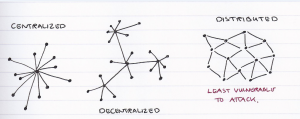“Blockchain’s decentralized, open… nature allow people to trust each other and transact peer to peer, making the need for intermediaries obsolete. This also brings unprecedented security benefits. Hacking attacks that commonly impact large centralized intermediaries like banks would be virtually impossible to pull off on the blockchain.” https://medium.com/blockchain-review/how-does-the-blockchain-work-for-dummies-explained-simply-9f94d386e093
I have been reading a lot about blockchain technology lately, trying to understand exactly what all the buzz is about. I am no technologist, but I know a good metaphor when I see one. And, before all you software developers reading this jump in – it is an imperfect metaphor, as social and digital networks are not exactly the same.
For the past seven years, I have been involved in an effort in the State of Maine to build a strong entrepreneurial ecosystem. This effort has been an evolution in network building and organizational structure. Sometimes deliberately and sometimes serendipitously, we have been moving from a centralized to a distributed network of individuals and organizations. Maine Accelerates Growth, from its inception in 2011 as Blackstone Accelerates Growth, moved from a centralized model with one executive director, to a decentralized model with three collaborating partners, to a more distributed network currently with 19 different organizational partners. These 19 partners have worked together since 2015 to build a strong and resilient entrepreneurial ecosystem, all with MTI’s quiet financial and administrative support.
This week, however, our ecosystem demonstrated that we haven’t arrived at a true distributed network, impervious to the social equivalent of hackers. Instead, our ecosystem showed its vulnerability – by allowing power and influence to be accumulated into one node or individual of the network, our network has been weakened. We have learned that one of our network “nodes” has behaved in inappropriate ways with female members of our ecosystem, many of whom felt unable to come forward for fear of his extensive influence within the network. By allowing one individual to position himself as a critical and prodigious leader without whom the network would founder, we disempowered others, most especially women, within the ecosystem.
Distributed networks are by their nature unmanaged and somewhat foreign to more traditional, closed styles – just as blockchain technology is foreign to most current transactional systems. And make no mistake, distributed networks, like Blockchain, disrupt the status quo. But our system’s concentration of influence proved to be a fragility revealed this week. By allowing one individual to be a trusted intermediary, rather than building a peer-to-peer trust-based network, our ecosystem suffered setback and loss: the loss of a promising new organization – Venture Hall, the loss of an opportunity for national leadership- the Kauffman Foundation Entrepreneurs Policy Network, and the loss of trust within the network.
Our entrepreneurial ecosystem, however, has also gained an opportunity: an opportunity to learn from mistakes, an opportunity to recognize and embrace the value in distributed networks, an opportunity for others to step forward who have been shunted to the side, an opportunity for open discussion about gender disparity. And, an opportunity to be better about sharing power, giving away credit, opening communication and fostering trust.
The lessons to be learned here are many. The national conversation happening now around gender roles, implicit power dynamics, appropriate behavior for men and women, and equity in the workplace – whether as volunteers, collaborators, or employees – is playing itself out within our networks, our ecosystem. It is up to us, the nodes of the network, to learn from the mistakes.

